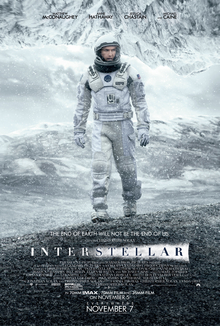In the future, food shortages have turned the Earth into an
agrarian society, and famine threatens to wipe out civilization. To prevent
this, the covert remnants of NASA recruit former pilot/astronaut-turned-farmer
Cooper (Matthew McConaughey) to lead a research team through a wormhole to find
suitable planets for resettlement. Cooper’s decision to accept the mission puts
him at odds with his daughter Murph, and a series of setbacks as well as time
dilation keep him absent for most of his children’s lives. However, Cooper
remains determined to both complete the mission and make it home.
Thanks to a (pun unintended) stellar track record, the
success of a Christopher Nolan film is almost a given at this point, which is
why the director deserves credit here for making his latest effort earn its
plaudits. Overly long, ambitious, complex, and spiritually as well as intellectually
challenging, Interstellar has its
share of shortcomings as well as moments of brilliance.
As with other Nolan fare, Interstellar packs a formidable stylistic punch. Working with a new
cinematographer (Wally Pfister was off directing his own far less successful
sci-fi film), Nolan imparts a sense of wonder and majesty into everything from
dust storms to frozen wastelands to the depths of space itself. Visually, the
film pays homage to 2001: A Space Odyssey
(among others) without wallowing in cliché (the robots aboard the ship, for
instance, resemble neither HAL nor androids). Meanwhile, Hans Zimmer’s score is
a departure from some of his previous work – don’t look for The Dark Knight’s scary strings here – that
still oozes gravitas.
This weightiness suits
Interstellar’s role as a Film of Ideas, a role it never lets you forget. Inspired
by the work of theoretical physicist Kip Thorne (who served as a consultant),
the movie aims to offer a grounded look at phenomena such as wormholes, black
holes, and gravitational time dilation. The presentation is the antithesis of
the breezily convenient space magic suggested by other sci-fi narratives as
Nolan and Thorne try to show their work.. Less scholastically, the film also
suggests that love is a universal force, but it’s an idea that comes across as
laughably hokey and naïve.
As a consequence of this preoccupation with theory and theme,
characterization takes a backseat for much of the voyage. Cooper is the kind of
everyman reluctant hero that Tom Hanks would have portrayed ten years ago. Having
McConaughey fill his shoes brings some emotional intensity, but this is still
sedate and rather bland compared to the rest of the Texan’s recent work. Three
different actresses portray Murph in different stages of her life, and each
performance hits the right note. Mackenzie Foy is precocious, Jessica Chastain
is bitter, and Ellen Burstyn is dignified. Beyond them, the other characters
are given little depth. As Cooper’s mentor Dr. Brand, Michael Caine feebly and persistently
quotes Dylan Thomas while Anne Hathaway portrays Brand’s daughter – and Cooper’s
fellow voyager – with an inexplicable foolhardy streak. Both of the voyage’s
robots (voiced by Bill Irwin and Josh Stewart), sarcastic, low-key, and
helpful, were of more interest than many of the supporting characters.
Unsurprisingly given the lack of attention to character,
dialogue is not a strong point here. Jonathan Nolan’s script has its moments.
As mentioned previously, the robots are quite amusing, and Cooper gets to
gloriously ream out some school administrators who treat the moon landings as a
hoax. Far too often, however, the dialogue comes across as stilted and
pedantic. This is especially true toward the film’s ending when Cooper monologues
everything that is happening to him as if he has a classroom full of physics
students watching his every move. Though done rather transparently for the
audience’s benefit, this scene plays as confusing as it does false.
Imperfect as it is, Interstellar
still manages to show that it is possible to emphasize the science side of
science fiction without boring an audience to tears. Though it could have
benefitted from a shorter running time and fuller characters, it still inspires
a fair amount of reverence and awe. Much like the journey depicted on screen,
you might not like what you see as you near the end, but it’s still a trip
worth taking.
8.25/10

No comments:
Post a Comment